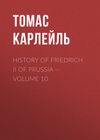Czytaj książkę: «History of Friedrich II of Prussia — Volume 16», strona 11
Chapter VIII. OST-FRIESLAND AND THE SHIPPING INTERESTS
Two Foreign Events, following on the heel of the Hirsch Lawsuit, were of interest to our Berlin friends, though not now of much to us or anybody. April 5th, 1751, the old King of Sweden, Landgraf of Hessen-Cassel, died; whereby not only our friend Wilhelm, the managing Landgraf, becomes Landgraf indeed (if he should ever turn up on us again), but Princess Ulrique is henceforth Queen of Sweden, her Husband the new King. No doubt a welcome event to Princess Ulrique, the high brave-minded Lady; but which proved intrinsically an empty one, not to say worse than empty, to herself and her friends, in times following. Friedrich's connection with Sweden, which he had been tightening lately by a Treaty of Alliance, came in the long-run to nothing for him, on the Swedish side; and on the Russian has already created umbrages, kindled abstruse suspicions, indignations,—Russian Excellency Gross, abruptly, at Berlin, demanding horses, not long since, and posting home without other leave-taking, to the surprise of mankind;—Russian Czarina evidently in the sullens against Friedrich, this long while; dull impenetrable clouds of anger lodging yonder, boding him no good. All which the Accession of Queen Ulrique will rather tend to aggravate than otherwise. [Adelung, vii. 205 (Accession of Adolf Friedrich); ib. 133 (Gross's sudden Departure).]
The Second Foreign Event is English, about a week prior in date, and is of still less moment: March 31st, 1751, Prince Fred, the Royal Heir-Apparent, has suddenly died. Had been ill, more or less, for an eight days past; was now thought better, though "still coughing, and bringing up phlegm,"—when, on "Wednesday night between nine and ten," in some lengthier fit of that kind, he clapt his hand on his breast; and the terrified valet heard him say, "JE SUIS MORT!"—and before his poor Wife could run forward with a light, he lay verily dead. [Walpole, GEORGE THE SECOND, i. 71.] The Rising Sun in England is vanished, then. Yes; and with him his MOONS, and considerable moony workings, and slushings hither and thither, which they have occasioned, in the muddy tide-currents of that Constitutional Country. Without interest to us here; or indeed elsewhere,—except perhaps that our dear Wilhelmina would hear of it; and have her sad reflections and reminiscences awakened by it; sad and many-voiced, perhaps of an almost doleful nature, being on a sick-bed at this time, poor Lady. She quitted Berlin months ago, as we observed,—her farewell Letter to Friedrich, written from the first stage homewards, and melodious as the voice of sorrowful true hearts to us and him, dates "November 24th," just while Voltaire (whom she always likes, and in a beautiful way protects, "FRERE VOLTAIRE," as she calls him) was despatching Hirsch on that ill-omened Predatory STEUER-Mission. Her Brother is in real alarm for Wilhelmina, about this time; sending out Cothenius his chief Doctor, and the like: but our dear Princess re-emerges from her eclipse; and we shall see her again, several times, if we be lucky.
And so poor Fred is ended;—and sulky people ask, in their cruel way, "Why not?" A poor dissolute flabby fellow-creature; with a sad destiny, and a sadly conspicuous too. Could write Madrigals; be set to make Opposition cabals. Read this sudden Epitaph in doggerel; an uncommonly successful Piece of its kind; which is now his main monument with posterity. The "Brother" (hero of Culloden), the "Sister" (Amelia, our Friedrich's first love, now growing gossipy and spiteful, poor Princess), are old friends:—
"Here lies Prince Fred,
Who was alive and is dead:
Had it been his Father,
I had much rather;
Had it been his Brother,
Sooner than any other;
Had it been his Sister,
There's no one would have missed her;
Had it been his whole generation,
Best of all for the Nation:
But since it's only Fred,
There's no more to be said." [Walpole, i. 436.]
FRIEDRIAH VISITS OST-FRIESLAND
A thing of more importance to us, two months after that catastrophe in London, is Friedrich's first Visit to Ost-Friesland. May 31st, having done his Berlin-Potsdam Reviews and other current affairs, Friedrich sets out on this Excursion. With Ost-Friesland for goal, but much business by the way. Towards Magdeburg, and a short visit to the Brunswick Kindred, first of all. There is much reviewing in the Magdeburg quarter, and thereafter in the Wesel; and reviewing and visiting all along: through Minden, Bielfeld, Lingen: not till July 13th does he cross the Ost-Friesland Border, and enter Embden. His three Brothers, and Prince Ferdinand of Brunswick, were with him. [—Helden-Geschichte,—iii. 506; Seyfarth, ii. 145; Rodenbeck, i. 216 (who gives a foolish German myth, of Voltaire's being passed off for the King's Baboon, &c.; Voltaire not being there at all).] On catching view of Ost-Friesland Border, see, on the Border-Line, what an Arch got on its feet: Triumphal Arch, of frondent ornaments, inscriptions and insignia; "of quite extraordinary magnificence;" Arch which "sets every one into the agreeablest admiration." Above a hundred such Arches spanned the road at different points; multitudinous enthusiasm reverently escorting, "more than 20,000" by count: till we enter Embden; where all is cannon-salvo, and three-times-three; the thunder-shots continuing, "above 2,000 of them from the walls, not to speak of response from the ships in harbor." Embden glad enough, as would appear, and Ost-Friesland glad enough, to see their new King. July 13th, 1751; after waiting above six years.
Next day, his Majesty gave audience to the new "Asiatic Shipping Company" (of which anon), to the Stande, and Magisterial persons;—with many questions, I doubt not, about your new embankments, new improvements, prospects; there being much procedure that way, in all manner of kinds, since the new Dynasty came in, now six years ago. Embankments on your River, wide spaces changed from ooze to meadow; on the Dollart still more, which has lain 500 years hidden from the sun. Does any reader know the Dollart? Ost-Friesland has awakened to wonderful new industries within these six years; urged and guided by the new King, who has great things in view for it, besides what are in actual progress.
That of dikes, sea-embankments, for example; to Ost-Friesland, as to Holland, they are the first condition of existence; and, in the past times, of extreme Parliamentary vitality, have been slipping a good deal out of repair. Ems River, in those flat rainy countries, has ploughed out for itself a very wide embouchure, as boundary between Groningen and Ost-Friesland. Muddy Ems, bickering with the German Ocean, does not forget to act, if Parliamentary Commissioners do. These dikes, 120 miles of dike, mainly along both banks of this muddy Ems River, are now water-tight again, to the comfort of flax and clover: and this is but one item of the diking now on foot. Readers do not know the Dollart, that uppermost round gulf, not far from Embden itself, in the waste embouchure of Ems with its continents of mud and tide. Five hundred years ago, that ugly whirl of muddy surf, 100 square miles in area, was a fruitful field, "50 Villages upon it, one Town, several Monasteries and 50,000 souls:" till on Christmas midnight A.D. 1277, the winds and the storm-rains having got to their height, Ocean and Ems did, "about midnight," undermine the place, folded it over like a friable bedquilt or monstrous doomed griddle-cake, and swallowed it all away. Most of it, they say, that night, the whole of it within ten years coming; [Busching,—Erdbeschreibung,—v. 845, 846; Preuss, i. 308, 309.]—and there it has hung, like an unlovely GOITRE at the throat of Embden, ever since. One little dot of an Island, with six houses on it, near the Embden shore, is all that is left. Where probably his Majesty landed (July 15th, being in a Yacht that day); but did not see, afar off, the "sunk steeple-top," which is fabled to be visible at low-water.
Upon this Dollart itself there is now to be diking tried; King's Domain-Kammer showing the example. Which Official Body did accordingly (without Blue-Books, but in good working case otherwise) break ground, few months hence; and victoriously achieved a POLDER, or Diked Territory, "worth about 2,000 pounds annually;" "which, in 1756, was sold to the STANDE;" at twenty-five years purchase, let us say, or for 50,000 pounds. An example of a convincing nature; which many others, and ever others, have followed since; to gradual considerable diminution of the Dollart, and relief of Ost-Friesland on this side. Furtherance of these things is much a concern of Friedrich's. The second day after his arrival, those audiences and ceremonials done, Friedrich and suite got on board a Yacht, and sailed about all over this Dollart, twenty miles out to sea; dined on board; and would have, if the weather was bright (which I hope), a pleasantly edifying day. The harbor is much in need of dredging, the building docks considerably in disrepair; but shall be refitted if this King live and prosper. He has declared Embden a "Free-Haven," inviting trade to it from all peaceable Nations;—and readers do not know (though Sir Jonas Hanway and the jealous mercantile world well did) what magnificent Shipping Companies and Sea-Enterprises, of his devising, are afoot there. Of which, one word, and no second shall follow:
"September 1st, 1750, those Carrousel gayeties scarce done, 'The Asiatic Trading Company' stept formally into existence; Embden the Head-quarters of it; [Patent, or FREYHEITS-BRIEF in—Helden-Geschichte,—iii. 457, 458.] chief Manager a Ritter De la Touche; one of the Directors our fantastic Bielfeld, thus turned to practical value. A Company patronized, in all ways, by the King; but, for the rest, founded, not on his money; founded on voluntary shares, which, to the regret of Hanway and others, have had much popularity in commercial circles. Will trade to China. A thing looked at with umbrage by the English, by the Dutch. A shame that English people should encourage such schemes, says Hanway. Which nevertheless many Dutch and many English private persons do,—among the latter, one English Lady (name unknown, but I always suspect 'Miss Barbara Wyndham, of the College, Salisbury'), concerning whom there will be honorable notice by and by.
"At the time of Friedrich's visit, the Asiatic Company is in full vogue; making ready its first ship for Canton. First ship, KONIG VON PREUSSEN (tons burden not given), actually sailed 17th February next (1752); and was followed by a second, named TOWN OF EMBDEN, on the 19th of September following; both of which prosperously reached Canton, and prosperously returned with cargoes of satisfactory profit. The first of them, KONIG VON PREUSSEN, had been boarded in the Downs by an English Captain Thomson and his Frigate, and detained some days,—till Thomson 'took Seven English seamen out of her.' 'Act of Parliament, express!' said his Grace of Newcastle. Which done, Thomson found that the English jealousies would have to hold their hand; no farther, whatever one's wishes may be.
"Nay within a year hence, January 24th, 1753, Friedrich founded another Company for India: 'BENGALISCHE HANDELS-GESELLSCHAFT;' which also sent out its pair of ships, perhaps oftener than once; and pointed, as the other was doing, to wide fields of enterprise, for some time. But luck was wanting. And, 'in part, mismanagement,' and, in whole, the Seven-Years War put an end to both Companies before long. Friedrich is full of these thoughts, among his other Industrialisms; and never quits them for discouragement, but tries again, when the obstacles cease to be insuperable. Ever since the acquisition of Ost-Friesland, the furtherance of Sea-Commerce had been one of Friedrich's chosen objects. 'Let us carry our own goods at least, Silesian linens, Memel timbers, stock-fish; what need of the Dutch to do it?' And in many branches his progress had been remarkable,—especially in this carrying trade, while the War lasted, and crippled all Anti-English belligerents. Upon which, indeed, and the conduct of the English Privateers to him, there is a Controversy going on with the English Court in those years (began in 1747), most distressful to his Grace of Newcastle;—which in part explains those stingy procedures of Captain Thomson ('Home, you seven English sailors!') when the first Canton ship put to sea. That Controversy is by no means ended after three years, but on the contrary, after two years more, comes to a crisis quite shocking to his Grace of Newcastle, and defying all solution on his Grace's side,—the other Party, after such delays, five years waiting, having settled it for himself!" Of which, were the crisis come, we will give some account.
On the third day of his Visit, Friedrich drove to Aurich, the seat of Government, and official little capital of Ost-Friesland; where triumphal arches, joyful reverences, concourses, demonstrations, sumptuous Dinner one item, awaited his Majesty: I know not if, in the way thither or back, he passed those "Three huge Oaks [or the rotted stems or roots of them] under which the Ancient Frisians, Lords of all between Weser and Rhine, were wont to assemble in Parliament" (WITHOUT Fourth Estate, or any Eloquence except of the purely Business sort),—or what his thoughts on the late Ost-Friesland Bandbox Parliaments may have been! He returned to Embden that night; and on the morrow started homewards; we may fancy, tolerably pleased with what he had seen.
"King Friedrich's main Objects of Pursuit in this Period," says a certain Author, whom we often follow, "I define as being Three. 1. Reform of the Law; 2. Furtherance of Husbandry and Industry in all kinds, especially of Shipping from Embden; 3. Improvement of his own Domesticities and Household Enjoyments,"—renewal of the Reinsberg Program, in short.
"In the First of these objects," continues he, "King Friedrich's success was very considerable, and got him great fame in the world. In his Second head of efforts, that of improving the Industries and Husbandries among his People, his success, though less noised of in foreign parts, was to the near observer still more remarkable. A perennial business with him, this; which, even in the time of War, he never neglects; and which springs out like a stemmed flood, whenever Peace leaves him free for it. His labors by all methods to awaken new branches of industry, to cherish and further the old, are incessant, manifold, unwearied; and will surprise the uninstructed reader, when he comes to study them. An airy, poetizing, bantering, lightly brilliant King, supposed to be serious mainly in things of War, how is he moiling and toiling, like an ever-vigilant Land-Steward, like the most industrious City Merchant, hardest-working Merchant's Clerk, to increase his industrial Capital by any the smallest item!
"One day, these things will deserve to be studied to the bottom; and to be set forth, by writing hands that are competent, for the instruction and example of Workers,—that is to say, of all men, Kings most of all, when there are again Kings. At present, I can only say they astonish me, and put me to shame: the unresting diligence displayed in them, and the immense sum-total of them,—what man, in any the noblest pursuit, can say that he has stood to it, six-and-forty years long, in the style of this man? Nor did the harvest fail; slow sure harvest, which sufficed a patient Friedrich in his own day; harvest now, in our day, visible to everybody: in a Prussia all shooting into manufactures, into commerces, opulences,—I only hope, not TOO fast, and on more solid terms than are universal at present! Those things might be didactic, truly, in various points, to this Generation; and worth looking back upon, from its high LAISSEZ-FAIRE altitudes, its triumphant Scrip-transactions and continents of gold-nuggets,—pleasing, it doubts not, to all the gods. To write well of what is called 'Political Economy' (meaning thereby increase of money's-worth) is reckoned meritorious, and our nearest approach to the rational sublime. But to accomplish said increase in a high and indisputable degree; and indisputably very much by your own endeavors wisely regulating those of others, does not that approach still nearer the sublime?
"To prevent disappointment, I ought to add that Friedrich is the reverse of orthodox in 'Political Economy;' that he had not faith in Free-Trade, but the reverse;—nor had ever heard of those ultimate Evangels, unlimited Competition, fair Start, and perfervid Race by all the world (towards 'CHEAP-AND-NASTY,' as the likeliest winning-post for all the world), which have since been vouchsafed us. Probably in the world there was never less of a Free-Trader! Constraint, regulation, encouragement, discouragement, reward, punishment; these he never doubted were the method, and that government was good everywhere if wise, bad only if not wise. And sure enough these methods, where human justice and the earnest sense and insight of a Friedrich preside over them, have results, which differ notably from opposite cases that can be imagined! The desperate notion of giving up government altogether, as a relief from human blockheadism in your governors, and their want even of a wish to be just or wise, had not entered into the thoughts of Friedrich; nor driven him upon trying to believe that such, in regard to any Human Interest whatever, was, or could be except for a little while in extremely developed cases, the true way of managing it. How disgusting, accordingly, is the Prussia of Friedrich to a Hanbury Williams; who has bad eyes and dirty spectacles, and hates Friedrich: how singular and lamentable to a Mirabeau Junior, who has good eyes, and loves him! No knave, no impertinent blockhead even, can follow his own beautiful devices here; but is instantly had up, or comes upon a turnpike strictly shut for him. 'Was the like ever heard of?' snarls Hanbury furiously (as an angry dog might, in a labyrinth it sees not the least use for): 'What unspeakable want of liberty!'—and reads to you as if he were lying outright; but generally is not, only exaggerating, tumbling upside down, to a furious degree; knocking against the labyrinth HE sees not the least use for. Mirabeau's Gospel of Free-Trade, preached in 1788, [MONARCHIE PRUSSIENNE he calls it (A LONDRES, privately Paris, 1788), 8 vols. 8vo; which is a Dead-Sea of Statistics, compiled by industrious Major Mauvillon, with this fresh current of a "Gospel" shining through it, very fresh and brisk, of few yards breadth;—dedicated to Papa, the true PROTevangelist of the thing.]—a comparatively recent Performance, though now some seventy or eighty years the senior of an English (unconscious) Fac-simile, which we have all had the pleasure of knowing,—will fall to be noticed afterwards [not by this Editor, we hope!]
"Many of Friedrich's restrictive notions,—as that of watching with such anxiety that 'money' (gold or silver coin) be not carried out of the Country,—will be found mistakes, not in orthodox Dismal Science as now taught, but in the nature of things; and indeed the Dismal Science will generally excommunicate them in the lump,—too. heedless that Fact has conspicuously vindicated the general sum-total of them, and declared it to be much truer than it seems to the Dismal Science. Dismal Science (if that were important to me) takes insufficient heed, and does not discriminate between times past and times present, times here and times there."
Certain it is, King Friedrich's success in National Husbandry was very great. The details of the very many new Manufactures, new successful ever-spreading Enterprises, fostered into existence by Friedrich; his Canal-makings, Road-makings, Bog-drainings, Colonizings and unwearied endeavorings in that kind, will require a Technical Philosopher one day; and will well reward such study, and trouble of recording in a human manner; but must lie massed up in mere outline on the present occasion. Friedrich, as Land-Father, Shepherd of the People, was great on the Husbandry side also; and we are to conceive him as a man of excellent practical sense, doing unweariedly his best in that kind, all his life long. Alone among modern Kings; his late Father the one exception; and even his Father hardly surpassing him in that particular.
In regard to Embden and the Shipping interests, Ost-Friesland awakened very ardent speculations, which were a novelty in Prussian affairs; nothing of Foreign Trade, except into the limited Baltic, had been heard of there since the Great Elector's time. The Great Elector had ships, Forts on the Coast of Africa; and tried hard for Atlantic Trade,—out of this same Embden; where, being summoned to protect in the troubles, he had got some footing as Contingent Heir withal, and kept a "Prussian Battalion" a good while. And now, on much fairer terms, not less diligently turned to account, it is his Great-Grandson's turn. Friedrich's successes in this department, the rather as Embden and Ost-Friesland have in our time ceased to be Prussian, are not much worth speaking of; but they connect themselves with some points still slightly memorable to us. How, for example, his vigilantes and endeavors on this score brought him into rubbings, not collisions, but jealousies and gratings, with the English and Dutch, the reader will see anon.
Law-reform is gloriously prosperous; Husbandry the like, and Shipping Interest itself as yet. But in the Third grand Head, that of realizing the Reinsberg Program, beautifying his Domesticities, and bringing his own Hearth and Household nearer the Ideal, Friedrich was nothing like so successful; in fact had no success at all. That flattering Reinsberg Program, it is singular how Friedrich cannot help trying it by every new chance, nor cast the notion out of him that there must be a kind of Muses'-Heaven realizable on Earth! That is the Biographic Phenomenon which has survived of those Years; and to that we will almost exclusively address ourselves, on behalf of ingenuous readers.




















